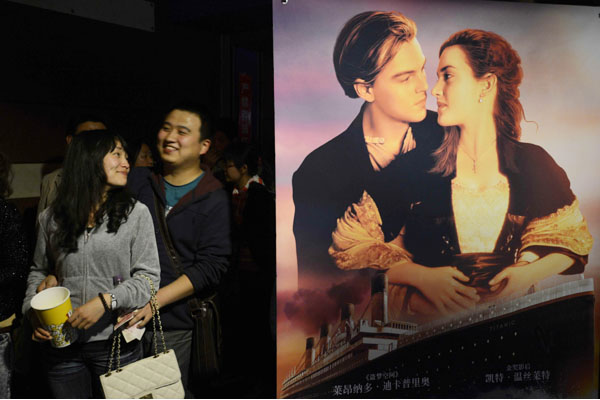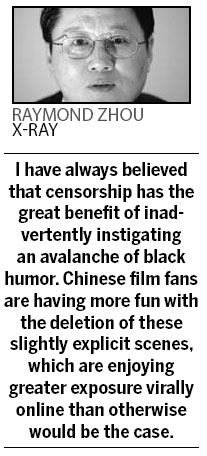Titanic recut
 |
|
A young couple from Taiyuan, Shanxi province, wait in a line to buy tickets for the premiere of the 3D version of Titanic on April 10. Hu Yuanjia / For China Daily |
In lieu of a ratings system, reasons subject to speculation and sarcasm underpin the cutting of a few frames from the new release of Titanic.
When Hollywood blockbuster Titanic was released in China 14 years ago, it was shown in its entirety. And when the unsinkable movie about a sinkable ship rolled around this time, two spots were deemed too steamy for the film-going public: Rose posing nude for Jack and the two making out in a vintage car.
So, they were trimmed.
The scenes are so familiar to many Chinese that the cuts became conspicuous by their absence and there was a collective roar of booing at the midnight premiere of the 3D version, according to press reports.
Since the two versions of James Cameron's disaster-cum-epic love story are identical, the newly conservative approach speaks more about the recipients rather than the makers of the film. But are Chinese people in general more puritanical than 14 years ago?
I seriously doubt anyone with a modicum of knowledge about the Middle Kingdom would say yes. In 1998, when the movie entered China, only a handful of people had access to the Internet. Sure, pornography had already infiltrated into the vast land via videotapes, but those were so blurry after repeated copying they were almost unwatchable.

It was the Internet, especially the wild-West mentality of the early years, which opened up most of my countrymen to the graphic depiction of the birds and bees, so to speak.
Most people I've talked to agreed that the nude scene and the sex scene in the movie are acceptable because they are mild and not gratuitous.
I can only surmise that censors are more inflexible than the general public.
Now, the Chinese population as a whole is truly more traditional than a Western country. What is taken for granted in North America, for example, may be a display of immodesty here in China. But China, in the past century, has undergone immense transformation in social mores.
In the old days, a man and a woman were not even allowed to see each other before getting married. Even in the early 1980s, when the floodgate to Western thoughts and lifestyles was opened, public displays of affection such as kissing or hugging were still considered signs of Western decadence and frowned upon by most people.
Now, nobody would raise their eyebrow while walking past a couple who seems to be inseparable standing on a street.
Things of this nature become more open (or dissolute, depending on your view), but movie censorship seems to be in reverse gear. It might be justified to prune the two scenes from Titanic in 1998, but the only purpose it serves now is moral grandstanding, which turns out to be so out of touch with reality it has become the butt of a joke.
The rationale floating around cyberspace for the cut, which is attributed to the censors but could more likely be the product of a satirist, goes like this: With 3D, the scenes are more lifelike, and audience at the cinema might be tempted to reach out and touch Rose's naked body, which could result in physical contact with someone sitting in the row in front. So, removing the frames is tantamount to preventing potential fistfights.
I have always believed that censorship has the great benefit of inadvertently instigating an avalanche of black humor. Chinese film fans are having more fun with the deletion of these slightly explicit scenes, which are enjoying greater exposure virally online than otherwise would be the case.
Curiosity is a notion totally unknown to censors, it would appear. By banning something, they invariably call attention to it, resulting in the most effective means of promoting it. The Story of Wuxun, a 1950 biopic about a country educator, was the first film to go on the blacklist in New China. Recently, it was finally released, on DVD, garnering a sea of press coverage and a badge of bruised honor.
Of course, censorship deals an economic blow to those who invested in the projects. That's lenient compared with the era of the purge when the filmmakers involved could lose their jobs and even freedom. Ning Hao's No Man's Land was finished three years ago, but it is still in censorship limbo, allegedly because it is too dark in tone. If it accidentally surfaces online, it would surely attract millions of eyeballs, but the investors cannot make any money legally. So, it may be better to leave it in the vault.
The history of Chinese cinema is littered with piles of never-released films that essentially served as a private collection for the censors or anyone high enough in the power hierarchy to see them. In the old days, some of these "bad" movies were shown to select audiences as material for denunciation. Those screenings always got a full house.
The lack of a ratings system for movies is wrecking havoc with China's film production. On one hand, films perfectly suitable for adults are bowdlerized against the will of the filmmaker; on the other hand, those that would never be seen by children in other civilized countries are released without any warning.
Take Zhang Yimou's Curse of the Golden Flower and The Flowers of War. The former has scenes of women in a lineup of such voluptuous titillation that many jaws dropped. The latter features a rape scene of underage girls. Granted, a film about the Nanjing Massacre cannot possibly relinquish the depiction of violence. But just imagine how traumatized a 10-year-old would become while watching such graphic content on the big screen. It's not the same as reading about it in a textbook.
A film ratings system is not an excuse for indulging in vulgarity of various forms. It is a label of warning for parents who have to watch out for the welfare of their underaged children. In the absence of this mechanism, China's screens do not become cleaner and more sterile. Instead, inappropriate content finds cinematic expressions in lofty names while serious subject matter has to be shelved, as if it was poison.
What happens in the name of protecting public interest, as a matter of fact, ends up treating the public as a homogenous group of children. At best, this is condescending; and at worst, it effectively binds the hands and feet of Chinese artists and permanently cripples them, making it impossible for them to turn China into a cultural powerhouse on a par with its rising economic prowess.
Contact the writer at raymondzhou@chinadaily.com.cn.






















